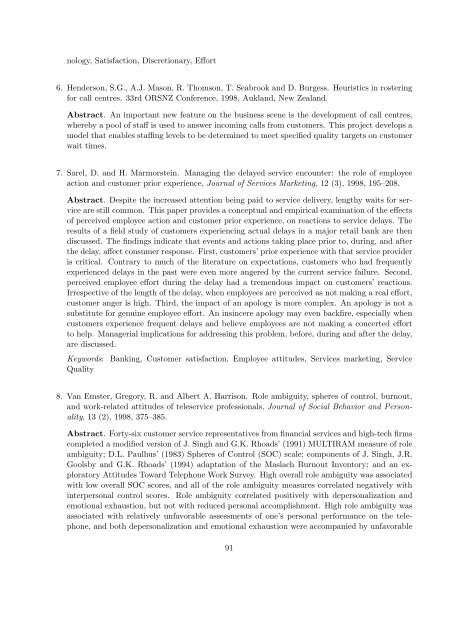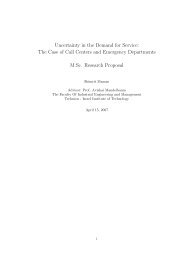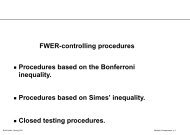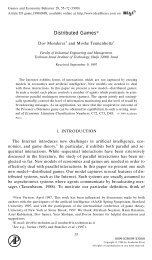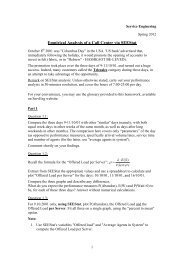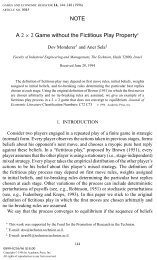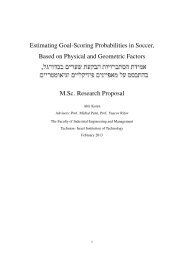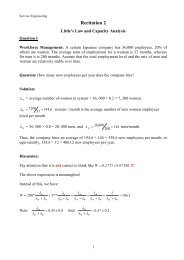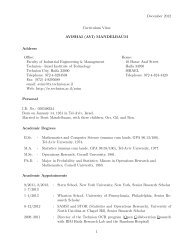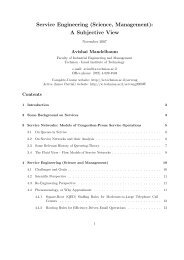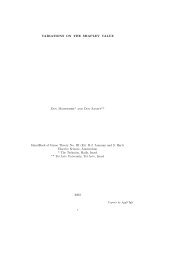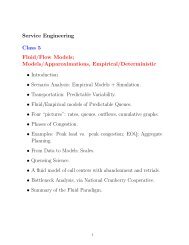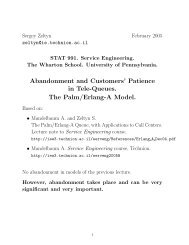CALL CENTERS (CENTRES) - Faculty of Industrial Engineering and ...
CALL CENTERS (CENTRES) - Faculty of Industrial Engineering and ...
CALL CENTERS (CENTRES) - Faculty of Industrial Engineering and ...
Create successful ePaper yourself
Turn your PDF publications into a flip-book with our unique Google optimized e-Paper software.
nology, Satisfaction, Discretionary, Effort<br />
6. Henderson, S.G., A.J. Mason, R. Thomson, T. Seabrook <strong>and</strong> D. Burgess. Heuristics in rostering<br />
for call centres. 33rd ORSNZ Conference, 1998, Aukl<strong>and</strong>, New Zeal<strong>and</strong>.<br />
Abstract. An important new feature on the business scene is the development <strong>of</strong> call centres,<br />
whereby a pool <strong>of</strong> staff is used to answer incoming calls from customers. This project develops a<br />
model that enables staffing levels to be determined to meet specified quality targets on customer<br />
wait times.<br />
7. Sarel, D. <strong>and</strong> H. Marmorstein. Managing the delayed service encounter: the role <strong>of</strong> employee<br />
action <strong>and</strong> customer prior experience, Journal <strong>of</strong> Services Marketing, 12 (3), 1998, 195–208.<br />
Abstract. Despite the increased attention being paid to service delivery, lengthy waits for service<br />
are still common. This paper provides a conceptual <strong>and</strong> empirical examination <strong>of</strong> the effects<br />
<strong>of</strong> perceived employee action <strong>and</strong> customer prior experience, on reactions to service delays. The<br />
results <strong>of</strong> a field study <strong>of</strong> customers experiencing actual delays in a major retail bank are then<br />
discussed. The findings indicate that events <strong>and</strong> actions taking place prior to, during, <strong>and</strong> after<br />
the delay, affect consumer response. First, customers’ prior experience with that service provider<br />
is critical. Contrary to much <strong>of</strong> the literature on expectations, customers who had frequently<br />
experienced delays in the past were even more angered by the current service failure. Second,<br />
perceived employee effort during the delay had a tremendous impact on customers’ reactions.<br />
Irrespective <strong>of</strong> the length <strong>of</strong> the delay, when employees are perceived as not making a real effort,<br />
customer anger is high. Third, the impact <strong>of</strong> an apology is more complex. An apology is not a<br />
substitute for genuine employee effort. An insincere apology may even backfire, especially when<br />
customers experience frequent delays <strong>and</strong> believe employees are not making a concerted effort<br />
to help. Managerial implications for addressing this problem, before, during <strong>and</strong> after the delay,<br />
are discussed.<br />
Keywords: Banking, Customer satisfaction, Employee attitudes, Services marketing, Service<br />
Quality<br />
8. Van Emster, Gregory, R. <strong>and</strong> Albert A. Harrison. Role ambiguity, spheres <strong>of</strong> control, burnout,<br />
<strong>and</strong> work-related attitudes <strong>of</strong> teleservice pr<strong>of</strong>essionals, Journal <strong>of</strong> Social Behavior <strong>and</strong> Personality,<br />
13 (2), 1998, 375–385.<br />
Abstract. Forty-six customer service representatives from financial services <strong>and</strong> high-tech firms<br />
completed a modified version <strong>of</strong> J. Singh <strong>and</strong> G.K. Rhoads’ (1991) MULTIRAM measure <strong>of</strong> role<br />
ambiguity; D.L. Paulhus’ (1983) Spheres <strong>of</strong> Control (SOC) scale; components <strong>of</strong> J. Singh, J.R.<br />
Goolsby <strong>and</strong> G.K. Rhoads’ (1994) adaptation <strong>of</strong> the Maslach Burnout Inventory; <strong>and</strong> an exploratory<br />
Attitudes Toward Telephone Work Survey. High overall role ambiguity was associated<br />
with low overall SOC scores, <strong>and</strong> all <strong>of</strong> the role ambiguity measures correlated negatively with<br />
interpersonal control scores. Role ambiguity correlated positively with depersonalization <strong>and</strong><br />
emotional exhaustion, but not with reduced personal accomplishment. High role ambiguity was<br />
associated with relatively unfavorable assessments <strong>of</strong> one’s personal performance on the telephone,<br />
<strong>and</strong> both depersonalization <strong>and</strong> emotional exhaustion were accompanied by unfavorable<br />
91


